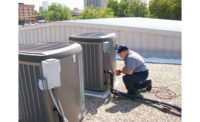Kroger, the largest grocery chain in the United States, is facing pressure from a coalition of stakeholders to eliminate HFCs from their refrigeration systems. Green America and Environmental Investigation Agency (EIA) called on consumers to sign a letter to Kroger CEO Rodney McMullen, demanding the company adopt ultra-low GWP refrigerants and replace current HFC systems at all of its nearly 2,800 stores by 2030. Currently, Kroger has only committed to using non-HFC alternatives at seven new stores.
The consumer action came just ahead of Kroger’s June 23 annual meeting at which a shareholder resolution filed by Friends Fiduciary was voted on that asked Kroger to prepare a report on eliminating the use of HFCs. The resolution noted that “Kroger’s apparent lack of a comprehensive plan to eliminate HFCs in refrigeration exposes Kroger to financial, regulatory, and reputational risks.”
“HFCs account for 63% of Kroger’s direct climate emissions,” said Dan Howells, director of climate campaigns at Green America. “Kroger has known about this problem for years, but its efforts are failing to meet the urgency of the issue. The climate crisis is here, and we need Kroger to provide a clear, detailed plan to cut these dangerous emissions on a more aggressive timeline.”
At the company’s Annual General Meeting, 35% of voting shareholders supported a resolution that the company issue a report on how the company plans to address its HFC use and meet its climate goals. In addition, over 12,000 customers signed the petition launched by Green America and EIA earlier in June, and both organizations plan to continue to putting pressure on Kroger until the company releases a plan to eliminate the use of HFCs. At the shareholder meeting, Kroger pledged to include HFCs in its upcoming 2022 Climate Roadmap but did not provide any specifics on how the company will address HFCs.
“While Kroger says it is pursuing ambitious carbon reduction targets, it continues to use obsolete potent super greenhouse gases for cooling,” said Avipsa Mahapatra, climate campaign lead at EIA. “The shareholder resolution and mounting customer pressure underline the reputational risks associated with this cognitive dissonance. Kroger has an obligation to stop its continued reliance on these gases, to walk the talk and become a part of the solution to the climate crisis.”
According to EIA, refrigerant leaks from U.S. supermarkets emit 45 million metric tons of greenhouse gases every year, the equivalent of 9.5 million cars on the road. Kroger scored only 16/100 on EIA’s 2020 Supermarket Scorecard, which tracks the largest U.S. supermarkets on their efforts to reduce HFC emissions, lagging behind its competitors: ALDI, Whole Foods, Target, Publix, Meijer, and others.









